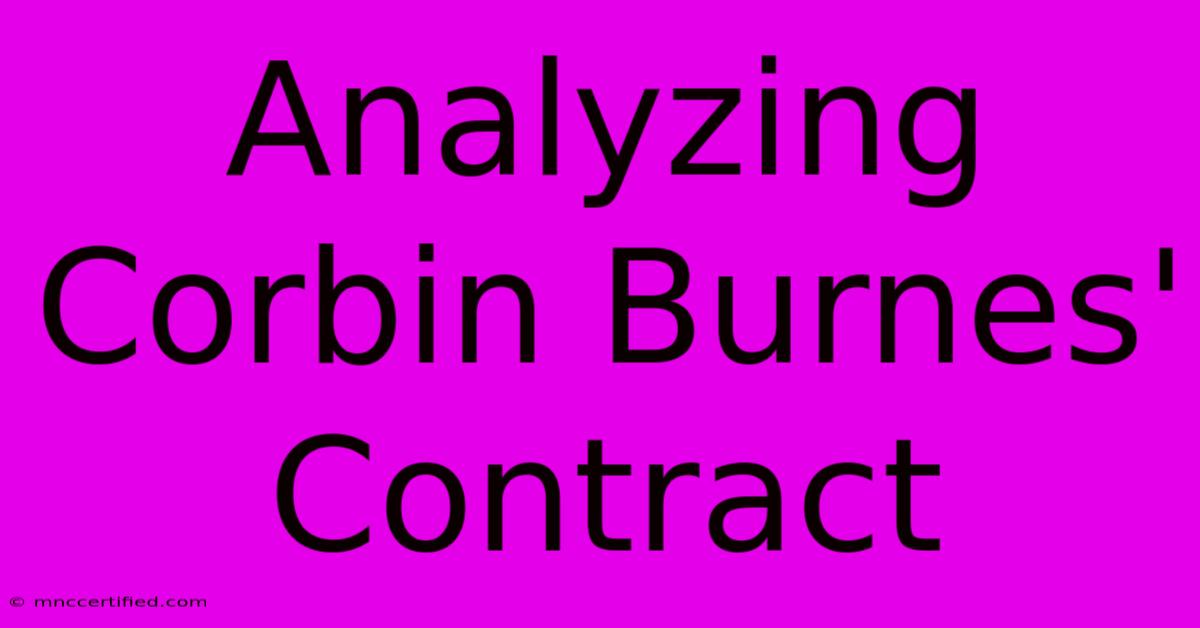Analyzing Corbin Burnes' Contract

Table of Contents
Analyzing Corbin Burnes' Contract: A Deep Dive into the Brewers' Ace
Corbin Burnes, the Milwaukee Brewers' ace, recently signed a highly-discussed contract extension. This article delves into the specifics of the deal, analyzing its implications for both Burnes and the Brewers organization. We'll explore the financial aspects, the strategic considerations, and the potential long-term impact on the team's competitiveness.
The Contract Breakdown: A Closer Look at the Numbers
Burnes' contract is a five-year, $102 million extension, avoiding salary arbitration and setting a significant precedent for high-performing pitchers. While the exact details might not be publicly available in granular detail, the key figures paint a clear picture. This represents a substantial investment by the Brewers, indicating their commitment to building a winning team around their star pitcher. Key aspects to consider:
- Average Annual Value (AAV): The $20.4 million AAV positions Burnes among the top-paid starting pitchers in the league. This reflects his recent performance and projected future value.
- Guaranteed Money: The guaranteed nature of the contract provides Burnes with financial security and demonstrates the Brewers' confidence in his abilities.
- Incentives: While specifics aren't publicly known, it's likely the contract includes performance-based incentives, potentially aligning Burnes' financial success with the team's on-field achievements. These could include bonuses based on wins, strikeouts, or other key metrics.
- Opt-Outs: Understanding whether or not the contract contains opt-out clauses is crucial. This would allow Burnes to re-enter the free agent market at a potentially more lucrative point in his career if his performance continues to exceed expectations.
Strategic Implications for the Brewers
The Brewers' decision to lock up Burnes long-term has significant strategic implications:
- Team Stability: Securing their top pitcher eliminates uncertainty and provides a foundation for building a consistent contender. This stability is crucial for attracting other free agents and building team chemistry.
- Competitive Window: The Brewers clearly believe Burnes' prime years align with their current competitive window. This long-term commitment signifies their ambition to win a World Series in the near future.
- Cost-Effectiveness: While substantial, the contract's value could be deemed cost-effective if Burnes continues his elite performance. His potential impact on the team's success far outweighs the monetary investment.
- Impact on Future Roster Decisions: The considerable commitment to Burnes will influence future roster moves. The Brewers will need to strategically allocate resources to build a supporting cast around him, balancing payroll considerations with the need for strong supporting players.
Assessing the Risk
While the contract presents significant upside, the Brewers also assume some risk:
- Injury: The unpredictable nature of baseball injuries always poses a risk. A significant injury could severely impact Burnes' performance and reduce the contract's value.
- Performance Decline: Even elite pitchers eventually experience declines in performance. The Brewers are betting on Burnes maintaining his high level of play throughout the duration of the contract.
- Market Fluctuations: The baseball market is dynamic. Future contracts for similarly talented pitchers could potentially exceed Burnes' AAV, making this deal seem less advantageous in hindsight.
Burnes' Perspective: A Career-Defining Moment
For Burnes, this contract represents a significant milestone in his career. It provides financial security and validation of his hard work and talent. The guaranteed money allows him to focus solely on his performance on the field without the added pressure of upcoming free agency.
Conclusion: A Win-Win Situation?
The Corbin Burnes contract appears to be a strategic move by the Brewers, aimed at solidifying their competitive standing and building a winning team. While risks are inherent in any long-term contract, the potential rewards far outweigh the downside for both Burnes and the Brewers organization. Only time will tell if this deal proves to be as advantageous as it currently appears. The upcoming seasons will offer a clear assessment of this significant contract's ultimate success. Further analysis should include comparisons to similar contracts and projections of Burnes' future performance.

Thank you for visiting our website wich cover about Analyzing Corbin Burnes' Contract. We hope the information provided has been useful to you. Feel free to contact us if you have any questions or need further assistance. See you next time and dont miss to bookmark.
Featured Posts
-
New Jersey Title Fight Boxer Bamba Dies
Dec 29, 2024
-
Sarris On Burnes A Brewers Coup
Dec 29, 2024
-
Carbon Monoxide Model Dayle Haddon Dies
Dec 29, 2024
-
Ucla Upsets Gonzaga Daileys Contribution
Dec 29, 2024
-
Scheffler Injured Christmas Dinner Incident
Dec 29, 2024